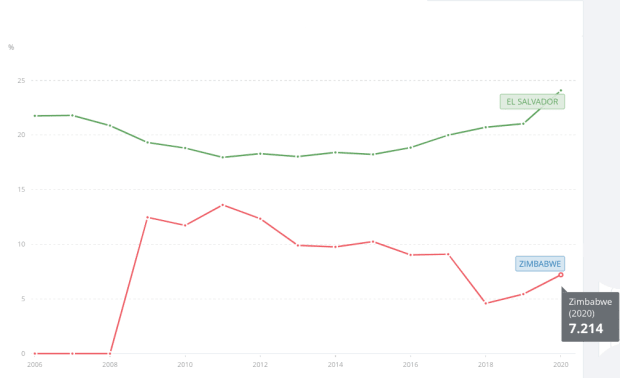- November 8, 2021
- Posted by: admin
- Category: BitCoin, Blockchain, Cryptocurrency, Investments
The government of Zimbabwe is reportedly considering adopting Bitcoin as legal payment service.
The government of Zimbabwe is reportedly considering adopting Bitcoin as legal a payment service, according to a local news outlet. The nation’s government is actively consulting with the private sector on the merits of Bitcoin and crypto.
During a Computer Society of Zimbabwe summit, Permanent Secretary and Head of e-government Technology Unit in the Office of the President Charles Wekwete announced that the Bitcoin and crypto consultations with the private sector are already in progress.

Zimbabwe’s government is reportedly “skeptical” that Bitcoin may externalize funds from the nation. According to data from the World Bank, Zimbabwe received 7.2% of its gross domestic product in remittances in 2020. While this is quite a step down from El Salvador’s 24% of GDP in remittance in 2020, if Zimbabwe accepted Bitcoin as legal currency, the nation would enjoy functionally commission-less and comparatively low-fee remittance.
Members of the Computer Society of Zimbabwe asked what the government was doing to adopt Bitcoin in light of El Salvador’s adoption and the massive global increase in adoption. Wekwete responded that many governments in the world are still not very clear on their Bitcoin and crypto policy.
Wekwete stated, “Governments are still trying to understand and properly trying to create policies on how to deal with it. In our case, initially we were trying to understand their implication because they are a fundamental departure from previously known financial instruments.”
He continued on the topic of consultation, “So Government has put in place mechanism to try and gather views from various sectors of society in order to eventually formulate policies.”
“Sooner or later Government will make statements but we have not gotten there yet, the consultative process is already underway,” said Wekwete. He went on to invite private sector players to reach out to government representatives.
Zimbabwe’s active consultation of Bitcoin experts should highlight just how the nation of El Salvador has benefited from Bitcoin adoption. It is only a matter of time before the world’s second nation allows its citizens to use Bitcoin as legal tender and begins to publicly buy and hold the asset in reserve.
If El Salvador’s path to adoption is any indication, nations who need Bitcoin are going to adopt it before the wealthier nations, who operate as if immune from the effects of endless money printing. However, Bitcoin will not stay niche. Every nation may have to contend with its rapid adoption sooner than they think.
